
Here are my top tips for the promoter and team that have been shortlisted for a Phase 2 interview for one of the New Frontiers programmes. It will focus on how to prepare your slidedeck and pitch to the Enterprise Ireland panel.
Enterprise Ireland panel: the criteria
Enterprise Ireland invests significant resources in the New Frontiers programme to facilitate the development of businesses with international potential. The first step in preparing your pitch is to understand what they are looking for. What are the criteria? In the FAQ section of the New Frontiers site, it says:
…in its first year, New Frontiers supported 150 entrepreneurs in the establishment of their new businesses. Within six months of those programme completing, many of the participating early-stage companies have achieved first sales (domestic and overseas), taken on new hires, secured investment from private equity companies, secured deals with large multi-nationals and have won a number of prestigious awards and accolades. 25 of those companies received equity investment from Enterprise Ireland (20 Competitive Start Fund investments and 5 HPSU investments).
So, at the New Frontiers Phase 2 interview stage you need to convince the panel that you are a credible promoter, that you have a plan and vision for the business, and that you can follow in the footsteps of these businesses.
At the end of Phase 1, and as part of your application form, promoters should be able to articulate the ‘early-stage business case’ as follows:
- A clear and concise description of the product or service to be developed
- A clear pain statement as to why customers will purchase the solution
- Product/service Unique Selling Points (USP)
- Research of the proposed market, intellectual property (IP), customers and competitors
- Initial route to market assessment
- Identified income streams and business model
- Initial financial analysis
- The promoter/team/advisory panel
- A clear set of short-term goals and milestones (for a six-month period) to achieve product and business development
In Galway, I am involved with a meetup group which meets to practice business pitches. Recently, we held an event to enable people to practice their pitch for New Frontiers Phase 2 in front of a live audience. It was a superb learning experience for everyone. The meetup was attended by several alumni from New Frontiers in Galway who shared their experiences with the group.
Another great #Business Meetup session about #NewFrontiers with @donnchadhh today in the @superpixellabs Games Room pic.twitter.com/gETb51C55G
— Superpixel Labs (@superpixellabs) June 2, 2016
Before the pitches, we asked everyone to break into groups and consider maybe six to eight criteria that the Enterprise Ireland panel would look for in a pitch. They were also asked to assign weights to each criteria. Please note that this meeting was not attended by personnel from Enterprise Ireland or GMIT New Frontiers. The infographic below presents the best guesstimate of the meetup group.
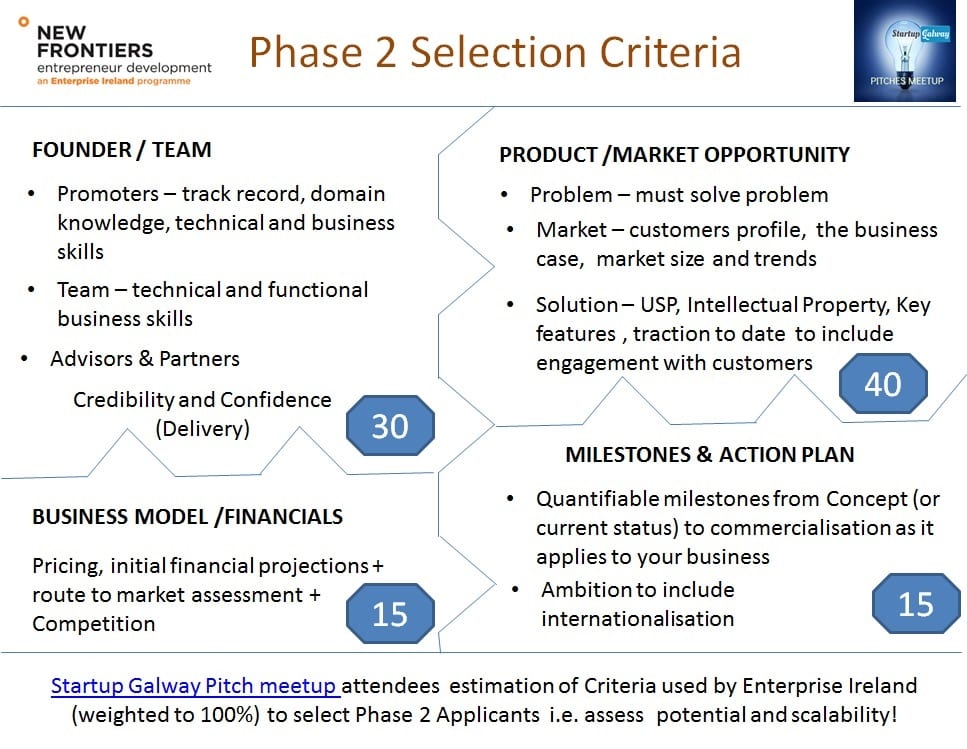 The key issue is to provide information to the panel so that they see the scaleability of your business.
The key issue is to provide information to the panel so that they see the scaleability of your business.
The Phase 2 Meet the Panel format
Each programme will use a similar format for the recruitment process. Promoters apply using a detailed application form after completing Phase 1. Shortlisted applicants are then called to meet a panel chaired by Enterprise Ireland, which includes private sector representation. Instructions will be provided to shortlisted applicants in advance. They will be asked to make a short presentation; the time allocated is eight to 10 minutes. A limited number of slides are allowed; this could be six or eight.
Six slides in 10 minutes
- Team – your and your team members’ experience
- Problem/gap/opportunity being addressed
- Product/service solution proposed
- Market opportunity – domestic and export
- Your proposed business model
- Future plans and milestones for the next six months
The pitch is followed by a Q&A, so the total time-slot per person could be between 20 and 25 minutes. The format can vary slightly, so the important issue is to tell the story of your business:
- so what… explain your solution in brief as it relates to the burning problem you are solving. If there is intellectual property, briefly mention it.
- who cares… who is the customer and how many are there? This feeds into market opportunity, so make sure to hit home why someone will actually buy it (if have time, you can explain about the competition and why your solution is better). If you have reference customers, mention those.
- why you… your background and track record with this business and any advisors you have.
- business model… the potential to make money and to internationalise – particularly if there is a route to market.
- key milestones for New Frontiers… what you hope to achieve over the six months and beyond.
You may notice that the first three slides are So what? Who cares? Why you? – which references the title of a Commercialisation Workbook by Canadian author, Wendy Kennedy. My view is that you don’t have to address every single business issue as there is going to be about 10 minutes for questions from the panel. You also don’t need to have every single answer to every business issue – that is what Phase 2 is for! However, you do need to be confident and credible in what you say, as such my final point is that you should practice your pitch. This should ideally be to a small group of people who have never heard the presentation before. It is also suggested that you should prepare answers for expected questions, so choose people who can ask good questions. Best of luck and hope this article is of benefit. Comments welcome!
Further reading from the blog:
10 tips for entrepreneurs thinking of applying to New Frontiers
About the author
 Donncha Hughes
Donncha Hughes
Donncha Hughes is a former incubation centre manager and has worked with startups for over ten years. A big advocate of Lean Startup, his areas of expertise include: marketing, sales, business models, supports for business, business plans and financial projections. An EI mentor and member of the CSF Evaluation Panel, Donncha specialises in working with early stage startups.
Recent articles

Raise Your Startup’s Visibility & Credibility By Entering These Competitions

Founder Perspectives: Lessons From Building Businesses In Sustainability

Tech Startups In The Age Of AI: Alumnus Paul Savage On Speed, Quality & Risk
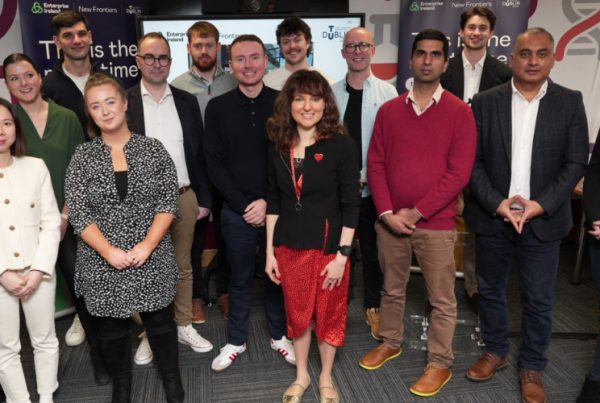
Fourteen Startup Founders Graduate From Phase 2 Of New Frontiers In Tallaght
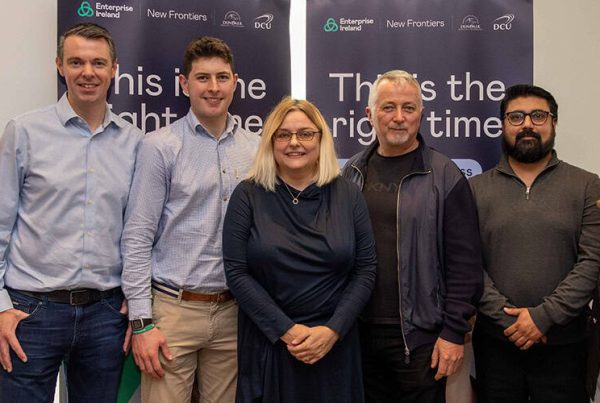
Eleven Founders Graduate From New Frontiers In The Border Mid-East Region

Laying The Right Groundwork Helps Startups Prepare For Export Success
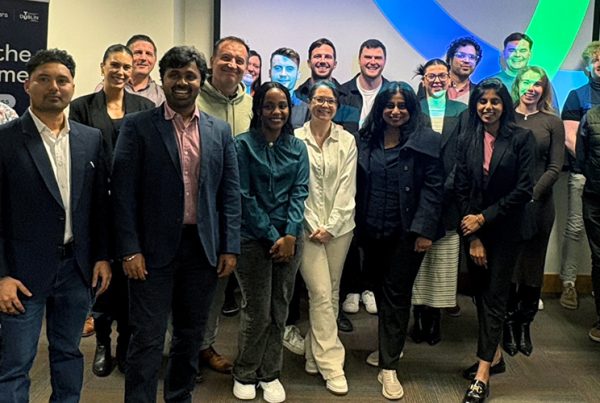
Startup In Dublin: Learn More About New Frontiers On TU Dublin’s Grangegorman Campus
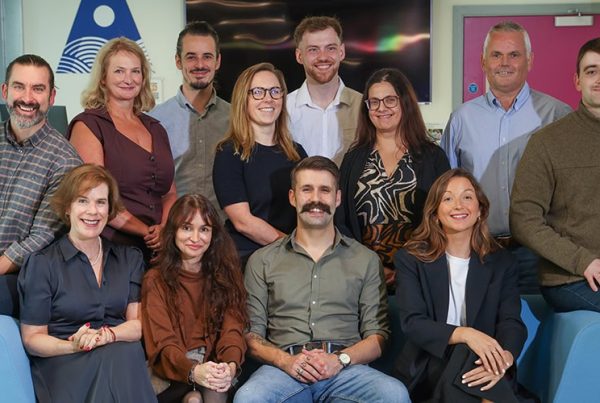
 Donncha Hughes
Donncha Hughes
